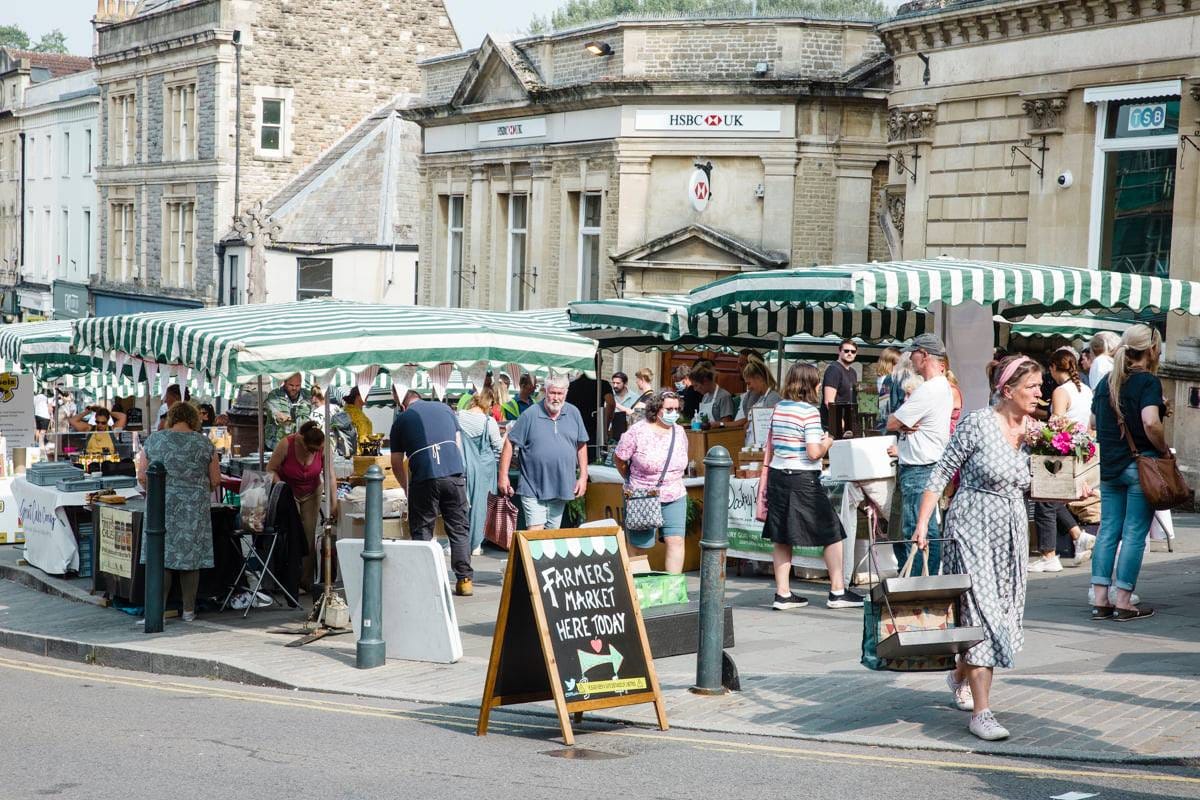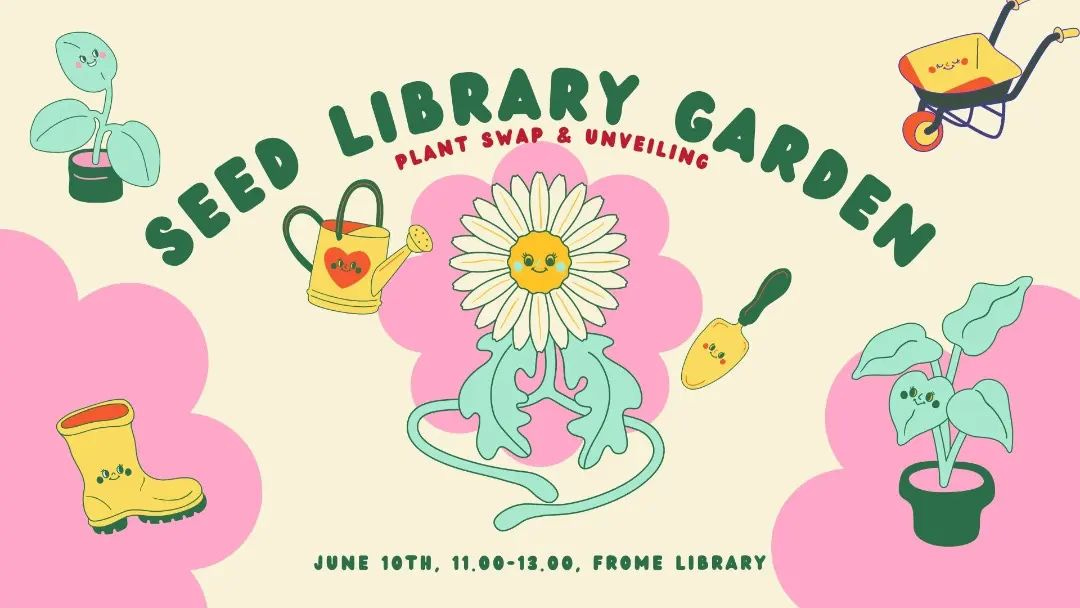Food and farming highlights for June's Great Big Green Week [WFJ #67]
9 ways to eat, drink, grow, forage, and intellectualise your way through June 10th-18th in Frome
For those not acquainted, Great Big Green Week is a nationwide ‘celebration of community action to tackle climate change and protect nature’.
The upcoming Frome iteration – 52 events in and around town, across eight days – encompasses just about anything from clothes swaps and litter picks to how to fix your bicycle and fashion musical instruments out of your household waste.
But, since you’re reading The Wallfish Journal, we’re more interested in what things might be worth partaking in from a carbon-saving or nature-friendly food perspective.
Consider this a WFJ-curated list of events, with added context and detail, as is customary here.
Lo Rapitenc's Market Menu
10th June, 12-3pm & 6-10pm; 21 Cheap St, Frome BA11 1BN; booking advised via lorapitenc.com
The Spanish deli and tapas restaurant Lo Rapitenc is, I like to think, a place of not just good food, but of good stories.
Perhaps this is because it relates to a cuisine rich in heritage, like how their escalivada is based on a dish shepherds would prep for their lunch in the Catalan mountains (explained in WFJ 16); their annual celebration of the Catalan leek-type vegetable calçots, grilled over coals, dredged in romesco, and chucked down one’s neck; and the chorizo and egg roll (or, what happens to the British delicacy of the sausage and egg sarnie when it’s come back from on holiday somewhere in the Iberian Peninsula).
That storied approach finds another chapter on the very first day of Great Big Green Week, where Somerset Farmers Markets sets up a few doors down from the restaurant on Boyle Cross. As a collaboration between the two, Lo Rapitenc’s Market Menu will, if for one day only, bring back the tradition of restaurants sourcing from the markets they neighbour.
In short, for lunch and dinner at Lo Rapitenc, expect Spanish tapas – but with a sizeable Somerset twist.
Frome Seed Library’s Garden Launch
10th June, 11am-1pm; Frome Library; free – no booking required
Over 60% of our food-growing is controlled by four companies, but, as covered in WFJ 24, the Frome Seed Library offers a means of participation in growing from seed outside of the corporate realm.
Since that article, and instrumentally via the unstoppable force that is Kerry Meech, the Seed Library has distributed over 1,300 seed packets, begun collecting specimens specific to Frome, and instigated a monthly gardeners club, called Sprouts, for under-5s. Now though, they launch their communal garden – outside Frome Library – featuring plants that the Sprouts grew from seed.
At the launch, expect a plant swap with Gardening Together; plenty of opportunities for little people to get their hands dirty; and a gallery of over 200 designs of a dream garden, as imagined by pupils from six Frome primary schools.
Food Waste to Magical Compost
11th June, 11:30am-1:30pm; Victoria Park Loop Compost HQ; free – no booking required
Given 95% of our food derives from the ground, the prospect of global soil’s gradual depletion over the coming decades is, I think it’s fair to say, not too fun.
A good thing, then, that we have local initiatives like Loop, who’re turning food waste from Frome cafes and restaurants into an incredibly rich soil amendment. As we learned not too long ago in WFJ 56, Loop is on the path of redefining how we perceive byproducts of food and drink. “One of the ways I try to look at it is there's no such thing as waste,” Loop co-founder Ben Still told The WFJ. “There's just misplaced resource.”
On the 11th, and from their Compost HQ in Vicky Park, there’ll be a good chance to buy some Frome ubercompost, participate in the circular economy, meet the team who make it happen, and see firsthand how they’re turning local food waste into this ‘living soil’.
Young People's Food Sustainability Workshop
13th June, 4-5:30pm; The Cheese & Grain; free – booking via Eventbrite
Science Boost, the Frome-based CIC improving the literacy of children and young people in the field of science, has a new objective – to get young people thinking and expressing their views on sustainability in a food context.
More specifically, this event upstairs in the Cheeser invites teenagers to be part of an enlightening debate about how their food is produced, and what impact it has on our health and that of the planet's.
Hugh Thomas (oh wait, that’s me!) from the Frome Food Network and The Wallfish Journal will indoctrinate your kids – I mean, fairly elucidate – on how food sustainability is relevant to Frome. Which includes who's producing what in the area, and how, if at all, it's compatible with conventional 'sustainable' discourses.
42 Acres Land & Food Tour
15th June, 9:30am-12pm; 42 Acres, BA11 5HL; free – booking via Eventbrite
WFJ 23 looked at how 42 Acres – the regenerative farm and retreat just outside Frome – espouses a closer relationship with and better understanding of how wildlife and the land can produce for humans in a very low-intervention way, albeit at its own pace.
Their Big Green Week event is very much on the same theme, and includes an interactive overview of what you might call alternative food production – what do they mean by agri-wilding? Is acorn flour a sustainable but still flavourful alternative to wheat? How can we harness wild bee populations to produce honey? And what in the seven hells is an edible hedge?
All that and much more is to be explored on the 15th – having been on one of these tours, they constitute an essential part of understanding alternative food sources and Frome’s greater food landscape.
Foraging & Nature Connection Walk
15th June, 10am-12:30pm; Rodden Meadow; £12 – book via onthewildside.com
As we already know from WFJ 8, Frome is a town of keen foragers. Or, more accurately, a town in which help getting more au fait with what foods are freely available in the wild is plenty on hand.
One character not mentioned as part of that story, but makes the headline appearance here, is George Linklater, a local forager and conservationist showing people what in the wild is good to eat and, importantly, what’s not.
What also makes things a bit different, and arguably more accessible, is that George’s foraging walk will take place pretty much in town, showcasing what Rodden Meadow has in store, as far as edibles, medicinals, and nature in general is concerned.
This Food is Rubbish
16th June, 7-10pm; Rye Bakery cafe (Whittox Lane); tickets from £15 – book via Ticket Tailor
Food, the dominant line of thought suggests, should be as cheap as possible to make and sell. The result of that is we’re somewhat unintentionally complicit in a system that perpetuates a seemingly never-ending state of devaluing food, both in terms of price and importance.
And so, whether completely broken or fully working as intended, the industrial food system enables – and even encourages – waste. While, in the same breath, there is already a surplus of local, largely untapped food and ingredients that exist outside of conventional supply.
As part of This Food is Rubbish – an “edible lecture” dinner with a zero-waste approach – local chef-artists Cherry Truluck and Annalee Levin seek to expose some of these failings while serving up usually neglected or overlooked dishes and ingredients. Think, maybe, Somerset wallfish; a brioche made with curly dock; and a risotto of grains too small for milling. “Our menu takes us from the beginnings of the growing cycle,” Cherry tells The WFJ, “through to pests and diseases, ideas of excess, food products and inconvenient grains, and invasive species and compost.”
A third of all food produced globally is either lost or wasted. Though much of that occurs in our homes, the issue is more systemic than it is the fault of individuals. “When we started researching this,” Cherry says, “we looked a bit closer and realised these figures only apply to the post-production stage of the food system.
“It made us question what we mean by food waste. At what point does a field of plants even become food rather than habitat? There is a philosophy of wastefulness prevalent in our food system tightly bound up with our cultural obsession with constant growth and mastery over nature.”
Having spoken to growers and other food producers also as part of their research, Cherry says that, rather than an overarching theme of profligate despair, a story of hopefulness has emerged. “In smaller scale, agro-ecological and ecologically minded businesses and sites, they had found ways to all but eliminate waste. They have designed circular and sustainable systems where the very concept of waste is transformed into an opportunity to regenerate life.”
Through This Food is Rubbish, Cherry and Annalee are creating a sort of “edible narrative” incorporating ingredients that too often end up in landfill, as well as the “practices of small-scale producers who work in the thirty miles between our two studios in Somerset.”
Ready Steady Cook with the Community Fridge
17th June, 12-4pm; Loop de Loop, BA11 1BE; free – no booking required
As pointed out in this newsletter several times before, Frome – like the rest of the country – suffers from a bit of a skills gap between fresh produce and a delicious, satisfying dinner. With the help of some competent chefs, Frome’s Community Fridge (the first of its kind in the UK) is here to save the day. Or, at least, demonstrate how using up free, surplus food doesn’t have to be a complicated feat.
Last time this happened, Ally Read from Foodage4thought (as featured in WFJ 46) went up against Mahesh of Lungi Babas to concoct a hearty, waste-saving meal. The winner? Resourcefulness. And the crowd – they were, after all, the ones who got fed.
Garden Gather at Broadway Community Gardens
18th June, 10am-12pm; BCG (entry from Oakfield Road); free – no booking required
The rather hidden-away Broadway Community Gardens, wedged in between Oakfield Road, Nunney Road, and Broadway, was recently saved from development by Frome Town Council.
This, should it need saying, is good news – it preserves a green space earmarked for community growing, and may prove a valuable conduit for improved mental health. As reported in WFJ 57, Broadway Community Gardens could offer an antidote to ecoanxiety (a condition experienced by a worryingly high number of young people), improve ecological literacy, and boost physical and mental wellbeing.
The best thing to do though is to see for yourself – this ‘garden gather’ is an opportunity to meet others who like to preserve and enjoy green spaces, grow food in a communal manner, if not get to know more about what the BCG project involves.
What’re you looking forward to most? Let us know in the comments.







